| 73rd North Carolina General Assembly (1860-1861) | |||||
|---|---|---|---|---|---|
| |||||
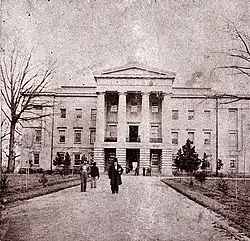 North Carolina State Capital in 1861 | |||||
| Overview | |||||
| Legislative body | North Carolina General Assembly | ||||
| Jurisdiction | North Carolina, United States | ||||
| Meeting place | State Capital building in Raleigh | ||||
| Term | 1860–1861 | ||||
| North Carolina Senate | |||||
| Members | 50 Senators | ||||
| President of the Senate | Henry Toole Clark | ||||
| Party control | Southern Democrats | ||||
| House of Commons | |||||
| Members | 120 Representatives | ||||
| Speaker of the House | William Theophilus Dortch | ||||
| Party control | Southern Democrats | ||||
The North Carolina General Assembly of 1860–1861 met in Raleigh, North Carolina in regular session from November 19, 1860, to February 25, 1861. They met in extra sessions from May 1, 1861, to May 13, 1861, and from August 15, 1861, to September 23, 1861. This General Assembly decided that each county should vote for special delegates who would decide whether North Carolina should secede from the Union. On May 20, 1861, those special delegates convened in Raleigh and voted unanimously that the state would no longer be a part of the United States of America.[1][2][3][4]
Councilors of State
The following persons were elected as Councilors of State on December 20, 1860:[3]
- John W. Cuningham Person
- W. L. Hilliard
- Council Wooten, Lenoir County
- W. A. Ferguson
- John J. Long
- David Murphy
- Jesse F. Graves, Surry County
Legislation
The general assembly passed numerous laws in 1860–1861, including the creation of Clay County from Cherokee County; creation of Mitchell County from Burke, Caldwell, McDowell, Watauga, and Yancey Counties; and the creation of Transylvania County from Henderson and Jackson Counties.[5]
The North Carolina Constitution was amended on May 20, 1861, to "dissolve the union between the State of North Carolina and the other states united with her under the compact of government entitled the Constitution of the United States of America."[6]
Members
House of Commons
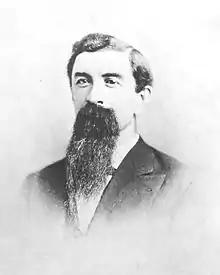
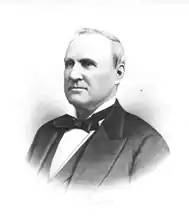

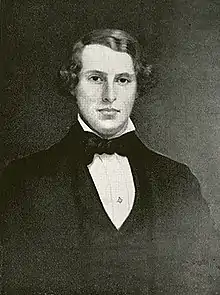

There were, per the North Carolina Constitution amended in 1825, 120 representatives in the House of Commons. Some counties had more representatives based on the county population. William T. Dortch was elected Speaker of the House of Commons. He served until he left to become the North Carolina Senator for the Congress of the Confederate States of America from 1862 to 1865. Nathan Neely Fleming was elected as Speaker after he departed. Edward Cantwell served as clerk. Eighty-two of the representatives were Southern Democrats.[2][3][4]
| County | No of Members in County | Member's Name (party in 1860) |
|---|---|---|
| Alamance | 2 | Giles Mebane (Whig)[7] |
| Alamance | 2 | John Tapscott |
| Alexander | 1 | John M. Carson |
| Anson | 2 | Edward R. Liles |
| Anson | 2 | Leonidas LaFayette Polk (Whig)[8] |
| Ashe | 1 | Thomas N. Crumpler[9] |
| Ashe | 1 | James M. Gentry |
| Beaufort | 2 | William T. Marsh |
| Beaufort | 2 | Richard Spaight Donnell (Whig)[10] |
| Bertie | 2 | Peyton T. Henry |
| Bertie | 2 | John R. Ferguson |
| Bladen | 1 | Charles T. Davis |
| Brunswick | 1 | Thomas D. Meares |
| Buncombe | 1 | Augustus Summerfield Merrimon (Southern Democrat)[11] |
| Burke | 1 | John H. Pearson |
| Cabarrus | 1 | William S. Harris |
| Caldwell | 1 | William W. Dickson |
| Camden | 1 | Dennis D. Ferebee |
| Carteret | 1 | David W. Whitehurst |
| Caswell | 2 | John Kerr (Whig)[12] |
| Caswell | 2 | Elijah K. Withers |
| Caswell | 2 | Samuel P. Hill |
| Catawba | 1 | Jonas Cline |
| Chatham | 3 | Robert N. Green |
| Chatham | 3 | William P. Taylor |
| Chatham | 3 | Turner Bynum |
| Cherokee | 1 | George W. Hayes |
| Chowan | 1 | Richard H. Small |
| Cleveland | 2 | Abraham G. Waters |
| Cleveland | 2 | John R. Logan |
| Columbus | 1 | Nathan L. Williamson |
| Craven | 2 | Frederick E. Alfred |
| Craven | 2 | Charles C. Clark |
| Cumberland | 3 | James S. Harrington |
| Cumberland | 3 | John C. Williams |
| Cumberland | 3 | Clement G. Wright |
| Currituck | 1 | Burwell M. Baxter |
| Davidson | 2 | Edmund B. Clark |
| Davidson | 2 | Lewis Hanes |
| Davie | 1 | Henry B. Howard |
| Duplin | 2 | John D. Stanford |
| Duplin | 2 | James G. Branch |
| Edgecombe | 2 | Robert R. Bridges |
| Edgecombe | 2 | James S. Woodard |
| Forsyth | 2 | Philip Barrow |
| Forsyth | 2 | John F. Poindexter |
| Franklin | 1 | William F. Green |
| Gaston | 1 | James H. White |
| Gates | 1 | John Boothe |
| Granville | 3 | James M. Bullock |
| Granville | 3 | Samuel H. Cannady |
| Granville | 3 | William H.P. Jenkins |
| Greene | 1 | Arthur D. Speight |
| Guilford | 3 | Julius L. Gorrell |
| Guilford | 3 | Cyrus P. Mendenhall |
| Guilford | 3 | Charles E. Shober |
| Halifax | 2 | Archibald H. Davis |
| Halifax | 2 | William B. Pope |
| Haywood | 1 | Samuel L. Love |
| Henderson | 1 | Joseph P. Jordan |
| Hertford | 1 | Jesse Johnson Yeates (Southern Democrat)[13] |
| Hyde | 1 | Tillman Farrow |
| Iredell | 2 | Asa B.F. Gaither |
| Iredell | 2 | Absalom Knox Simonton |
| Jackson | 1 | James R. Love[9] |
| Jackson | 1 | Allen Fisher |
| Johnston | 2 | James Mitchiner |
| Johnston | 2 | William H. Watson |
| Jones | 1 | William P. Ward |
| Lenoir | 1 | John C. Wooten |
| Lincoln | 1 | John F. Hoke[14] |
| Lincoln | 1 | V. A. McBee |
| Macon | 1 | David W. Siler[12] |
| Macon | 1 | Henry G. Woodfin |
| Madison | 1 | John A. Fagg |
| Martin | 1 | Joshua L. Ewell |
| McDowell | 1 | Charles H. Burgin |
| Mecklenburg | 2 | Stephen W. Davis |
| Mecklenburg | 2 | John McK. Potts |
| Montgomery | 1 | Edmund G.L. Barringer |
| Moore | 1 | Alexander Kelly |
| Nash | 1 | Henry G. Williams |
| New Hanover | 2 | Samuel J. Person |
| New Hanover | 2 | Daniel Shaw |
| Northampton | 2 | Matthew Whitaker Ransom[15] |
| Northampton | 2 | William W. Peebles |
| Onslow | 1 | James H. Foy |
| Orange | 2 | Hugh B. Guthrie |
| Orange | 2 | William N. Patterson |
| Pasquotank | 1 | John T. Williams |
| Perquimans | 1 | Nathan Newby |
| Person | 1 | John D. Wilkerson |
| Pitt | 2 | Burton J. Albritton |
| Pitt | 2 | Churchill Perkins |
| Randolph | 2 | Isaac H. Foust |
| Randolph | 2 | Thomas L. Winslow |
| Richmond | 1 | John G. Blue |
| Robeson | 2 | Alexander McMillan |
| Robeson | 2 | Eli Wishart |
| Rockingham | 2 | Rawley Galloway |
| Rockingham | 2 | Thomas S. Slade |
| Rowan | 2 | Newberry F. Hall |
| Rowan | 2 | Nathan Neely Fleming |
| Rutherford | 2 | Champion T.N. Davis |
| Rutherford | 2 | Berryman H. Paget |
| Sampson | 2 | George W. Autrey |
| Sampson | 2 | Nehemiah C. Faison |
| Stanly | 1 | Lafayette Green |
| Stokes | 1 | Horatio P. Kallum |
| Surry | 1 | Harrison M. Waugh |
| Tyrrell | 1 | Charles McCleese |
| Union | 1 | Cyrus Q. Lemmond |
| Wake | 3 | Henry Mordecai |
| Wake | 3 | Sion H. Rigers |
| Wake | 3 | John P. H. Russ |
| Warren | 2 | Joseph B. Batchelor |
| Warren | 2 | William H. Clark |
| Washington | 1 | Charles Latham |
| Watauga | 1 | George N. Folk[16] |
| Watauga | 1 | Thomas Farthing |
| Wayne | 2 | William Theophilus Dortch (Speaker, Southern Democrat)[17] |
| Wayne | 2 | Marcus K. Crawford |
| Wilkes | 2 | Augustus H. Martin |
| Wilkes | 2 | Phineas T. Horton |
| Yadkin | 1 | Andrew C. Cowles |
| Yancey | 1 | Jacob Weaver Bowman[18] |
Senate
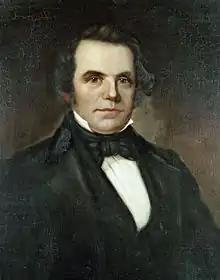
.jpg.webp)



Henry Toole Clark was elected Speaker or President of the Senate. As such, he was first in line of succession to the Governor since there was no Lieutenant Governor until 1868. When Governor John Willis Ellis died of tuberculosis on July 7, 1861, Senator Clark took over as Governor and remained in that position until September 8, 1862. He was thrust into this leadership position just as the U.S. Civil War started. Thirty-two of the Senators were Southern Democrats.[19]
The clerk of the Senate was J.W. Alspaugh. Senator William Holland Thomas was an adopted chief of the Eastern Band of the Cherokee Nation and represented their interests as he served in the Senate from 1849 to 1861.[4][3][1][20]
Senators William Waightstill Avery and John Motley Morehead served as delegates from North Carolina to the Provisional Congress of the Confederate States of America in the third through fifth sessions in 1861 and 1862.
The following table lists the Senators from the 50 Districts in North Carolina.[2][4][3]
| District | Counties Represented | Senator (party) | Home County |
|---|---|---|---|
| 1 | Pasquotank & Perquimans | James M. Whedbee | Perquimans |
| 2 | Camden & Currituck | Benjamin T. Simmons | Currituck |
| 3 | Chowan & Gates | Mills H. Eure | Gates |
| 4 | Hyde & Tyrrell | Jones Spencer | Tyrrell |
| 5 | Northampton | Joseph M.S. Rogers | Northampton |
| 6 | Hertford | Joseph B. Slaughter | Hertford |
| 7 | Bertie | David Outlaw (Whig)[21] | Bertie |
| 8 | Martin & Washington | Jesse R. Stubbs | Martin |
| 9 | Halifax | Matthew Cary Whitaker | Halifax |
| 10 | Edgecombe | Henry Toole Clark (Southern Democrat, Speaker)[19] | Edgecombe |
| 11 | Pitt | Elias J. Blount | Pitt |
| 12 | Beaufort | Frederick Grist | Beaufort |
| 13 | Craven | Nathan H. Street | Craven |
| 14 | Carteret & Jones | M.F. Arendell | Carteret |
| 15 | Greene & Lenoir | James P. Speight | Greene |
| 16 | New Hanover | Eli W. Hall | New Hanover |
| 17 | Duplin | James Dickson | Duplin |
| 18 | Onslow | Lott W. Humphrey | Onslow |
| 19 | Bladen, Brunswick, & Columbus | John D. Taylor | Brunswick |
| 20 | Cumberland | Duncan Shaw | Cumberland |
| 21 | Sampson | Thomas I. Faison | Sampson |
| 22 | Wayne | William K. Lane | Wayne |
| 23 | Johnston | J.W.B. Watson | Johnston |
| 24 | Wake | Moses A. Bledsoe | Wake |
| 25 | Nash | A.G. Taylor | Nash |
| 26 | Franklin | Washington Harris | Franklin |
| 27 | Warren | Thomas J. Pritchard | Warren |
| 28 | Granville | C.H.K. Taylor | Granville |
| 29 | Person | C.S. Winstead | Person |
| 30 | Orange | Josiah Turner Jr. | Orange |
| 31 | Alamance & Randolph | Jonathan Worth (Southern Democrat)[22] | Randolph |
| 32 | Chatham | W.S. Harris | Chatham |
| 33 | Montgomery & Moore | Willis D. Dowd | Moore |
| 34 | Richmond, & Robeson | Alfred Dockery (Know Nothing)[23] | Richmond |
| 35 | Anson & Union | Samuel H. Walkup | Union |
| 36 | Guilford | John Motley Morehead (Whig)[24] | Guilford |
| 37 | Caswell | Bedford Brown (Southern Democrat)[25] | Caswell |
| 38 | Rockingham | Francis L. Simpson | Rockingham |
| 39 | Mecklenburg | John Walker | Mecklenburg |
| 40 | Cabarrus & Stanly | Victor C. Barringer | Cabarrus |
| 41 | Davie & Rowan | James Graham Ramsay | Rowan |
| 42 | Davidson | John W. Thomas | Davidson |
| 43 | Forsyth & Stokes | John A. Waugh | Forsyth |
| 44 | Ashe, Surry, Watauga, & Yadkin | Joseph H. Dobson | Surry |
| 45 | Alexander, Iredell, Wilkes | Leander Q. Sharpe | Iredell |
| 46 | Burke, Caldwell, & McDowell | William Waightstill Avery (Southern Democrat)[26] | Burke |
| 47 | Catawba, Gaston, & Lincoln | J. Stowe | Lincoln |
| 48 | Cleveland & Rutherford | A.W. Burton | Cleveland |
| 49 | Buncombe, Henderson, Madison, & Yancey | Marcus Erwin | Buncombe |
| 50 | Cherokee, Haywood, Jackson, & Macon | William Holland Thomas[20] | Jackson |
References
- 1 2 Lewis, J.D. "North Carolina State Senators 1860-1861". The American Revolution in North Carolina. Retrieved September 29, 2019.
- 1 2 3 Lewis, J.D. "North Carolina State House 1860-1861". The American Revolution in North Carolina. Retrieved September 29, 2019.
- 1 2 3 4 5 Connor, R.D.D. (1913). A Manual of North Carolina (PDF). Raleigh: North Carolina Historical Commission. Retrieved September 29, 2019.
- 1 2 3 4 Wheeler, John H. (1874). The Legislative Manual and Political Register of the State of North Carolina. Retrieved September 29, 2019.
- ↑ "Public Laws Passed of the State of North Carolina Passed by the General Assembly of 1860-186". Raleigh, North Carolina: John Spelman, Printer of the State. 1861.
- ↑ "North Carolina Constitution and Amendments". NHINET.ORG. Retrieved October 3, 2019.
- ↑ Stokes, Durward T. (1991). "Giles Mebane". NCPedia. Retrieved September 29, 2019.
- ↑ Noblin, Stuart (1994). "Leonidas Lafayette Polk". NCPedia. Retrieved September 29, 2019.
- 1 2 Resigned his seat to join the Conferate Army
- ↑ Carraway, Gertrude S. (1986). "Richard Spaight Donnell". NCPedia. Retrieved September 29, 2019.
- ↑ Bell, John L. Jr. (1991). "Augustus Summerfeld Merrimon". NCPedia. Retrieved September 29, 2019.
- 1 2 Resigned his seat
- ↑ Parramore, T. C. (1996). "Jesse Johnson Yeates". NCPedia. Retrieved September 29, 2019.
- ↑ Resigned his seat after being appointed Adjutant General, joined the Confederate Army
- ↑ Barrett, John G. (1994). "Matthew Whitaker Ransom". NCPedia. Retrieved September 29, 2019.
- ↑ Resigned his seat, joined the Confederate Army
- ↑ Yearns, Buck (1986). "William Theophilus Dortch". NCPedia. Retrieved September 29, 2019.
- ↑ Hightower, Emily K. (1979). "Jacob Weaver Bowman". NCPedia. Retrieved September 29, 2019.
- 1 2 Iobst, Richard W. (1979). "Henry Toole Clark". NCPedia. Retrieved September 30, 2019.
- 1 2 McKinney, Gordon B. (1996). "William Holland Thomas". NCPedia. Retrieved September 30, 2019.
- ↑ Littleton, Rebecca B. (1991). "David Outlaw". NCPedia. Retrieved September 29, 2019.
- ↑ Zuber, Richard L. (1996). "Jonathan Worth". NCPedia. Retrieved September 29, 2019.
- ↑ Fawcett, Michael J. (1986). "Alfred Dockery". NCPedia. Retrieved September 29, 2019.
- ↑ Kearney, H. Thomas, Jr. (1991). "John Motley Morehead". NCPedia.
{{cite web}}: CS1 maint: multiple names: authors list (link) - ↑ Jones, H. G. (1979). "Bedford Brown". NCPedia. Retrieved September 30, 2019.
- ↑ Watson, Elgiva D. (1979). "William Waightstill Avery". NCPedia. Retrieved September 30, 2019.